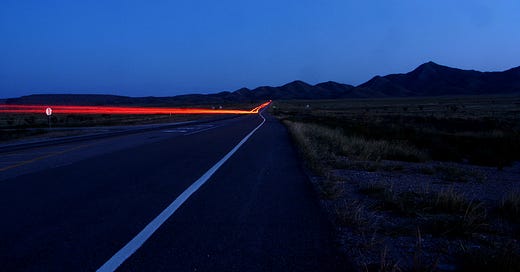‘HOTEL CALIFORNIA’ AND PRISONS OF OUR OWN MAKING
Many of us linger in self-imposed captivity. These cells are not located in some remote Californian outpost either; we carry them around with us wherever we go.
An evening drive along a desert highway ends up at a strange, isolated hotel. A ‘mission bell’ sounds and the driver is lured inside by a mysterious siren who introduces him to ‘Tiffany-twisted’ femme fatales who are seemingly engaged in a non-stop party.
Initially seductive and alluring, the evening turns nightmarish when the hero realizes it is impossible to leave and that the sinister bacchanalia-- with its pink champagne, mirrored ceilings and impossible-to-kill beasts-- is for all eternity.
The haunting Eagle’s song HOTEL CALIFORNIA was inspired by the hollow decadence of the rock star’s life the band were fully embedded in during the mid-70’s; the endless tour dates and lonely hotel rooms, the drink and drugs, the oppressive adoration of the fans, the cynical money-obsessed record companies…. the band led a lifestyle that seemed utterly glamorous but also felt like a trap.
The song, despite its chilling narrative, was a huge hit. Perhaps this was because it captured the zeitgeist of those times-- that mid-70’s malaise when the American Dream seemed tarnished and the hopes of the 60’s had long since dissipated. It also expressed something universal on a personal level: the idea of ‘prisons of our own device’.
Nothing has changed since the 70’s and many of us linger in self-imposed captivity. These cells are not located in some remote Californian outpost either; we carry them around wherever we go and they come in various shapes and sizes:
Sometimes they take the form of commitments we don’t want to keep. Or possessions we don’t need. People we don’t love. Work we don’t want to do. Obligations and debt we struggle to endure.
The prison can take the shape of simple fear or low self-esteem, stopping us from doing the things that might fulfill us:
We don’t launch a new business because we think we don’t have what it takes. We hesitate to apply for a promotion, assuming that someone far more competent will get it. We don’t ask people out on a date if they seem out of our league. And how many of us are burnt-out walking resumes trapped in our parents’ hopes-- fulfilling their dreams for us rather than our own?
Our prisons can be extremely subtle-- enveloping us in gossamer rather than brick and steel: pride, self-centeredness, materialism, black and white thinking— all can entrap us.
We complain about being in jail, but we secretly find it safe. We feel a sense of comfort in the discomfort: the dysfunctional relationship that fits like an old shoe. The comfort eating that fills the vacuum inside us. The drink and drugs that nullify our feelings—at least temporarily. But unlike the unfortunate guest in Hotel California we can check out.
The first step is to admit that we are imprisoned. We make an inventory of how we feel trapped. We trust our instincts. Perhaps we seek objective counsel to help us do this. Then, in order to escape, in order for us to have the life that we desire, we must live in the emotions of our new reality. When we practice the feelings associated with abundance, love, and inspiration—when we ‘act as if’-- then those feelings ensure the new reality shows up.
Let’s not pretend that any of this is easy. We might even need to seek professional help with our escape plan. And that first step out of captivity can be profoundly disorienting; the sunlight can blind us. But gradually, with time and effort, our new co-ordinates no longer disorientate us and we can feel truly free.
What does it feel like? What is it like to have autonomy over the one thing in existence we have real control over: ourselves? Perhaps Moshe Dayan said it best when she said ‘freedom is the oxygen of the soul’.
And knowing freedom will make us recoil from prisons forevermore. So the next time we’re driving along a dark desert highway, we’ll have the wisdom to simply keep on driving.




They are not called the trappings of life without reason.
We can end up the curators of our lives rather than participants....
Hope you are good Ivor